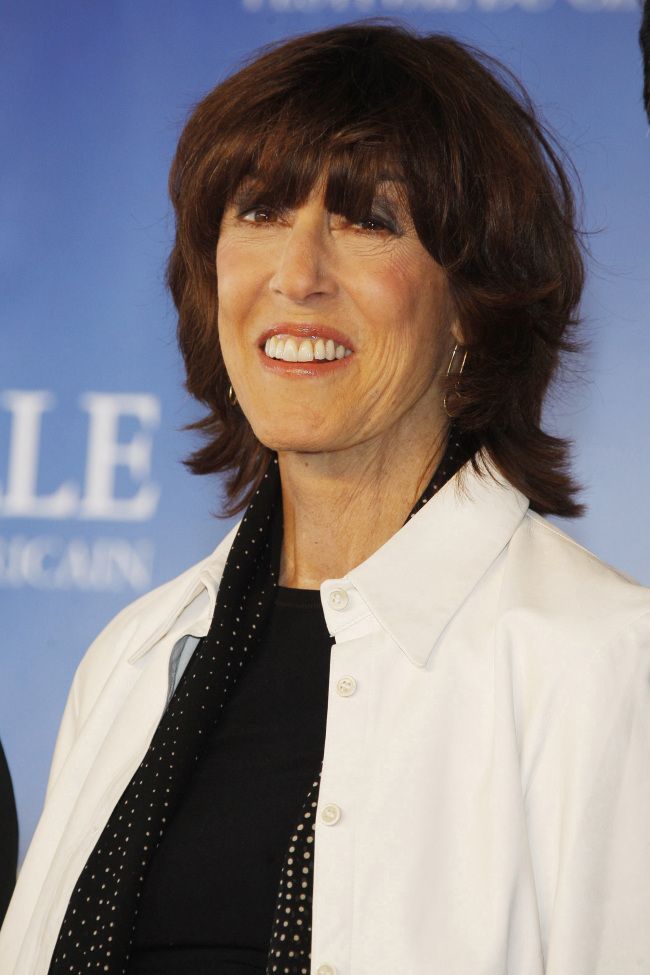 |
Nora Ephron in 2009 (MCT) |
In her poignant 2010 essay “What I Will Miss,” which appears on the last page of a new omnibus, “The Most of Nora Ephron” (Alfred A. Knopf.), the author listed 31 items ― bacon, Paris and “the concept of waffles,” among them. There’s one thing she left out, I would venture to guess: writing.
Though it was kept secret from all but her immediate circle, Ephron knew she was terminally ill with leukemia for six years before her death in 2012. If anything, this increased her productivity. According to her sister Delia (who also has a new book), the sisters worked on a TV pilot in Nora’s hospital room, and even took a phone meeting with producer Scott Rudin. One project Nora started but didn’t get to complete was the selection of pieces for this career-spanning collection.
Her lifelong editor Robert Gottlieb finished it, commenting in his introduction, “No other editorial job I’ve ever performed has been so much fun.”
It could hardly be otherwise. Mostly, “The Most of Nora Ephron” is a pleasure. Her best-loved magazine pieces and essays are arranged not chronologically but in thematic groups: The Journalist, The Advocate, The Foodie, The Blogger and so forth, sometimes skipping 30 years or more from one piece to the next. Sandwiched between these sections are the novel “Heartburn,” the screenplay of “When Harry Met Sally ...” and the script of “Lucky Guy.”
A few of the feminist and political essays feel dated, and the blogs should have been left out entirely. Scooter Libby, Condoleezza Rice, Dick Cheney ― do we really want to read about these people anymore? But the profiles of Dorothy Parker and Lillian Hellman, the Wellesley commencement address, the hilarious “Lisbeth Salander: The Girl Who Fixed the Umlaut” ― these are solid gold. The essay she wrote to accompany the script for “When Harry Met Sally...” is a fascinating account of the collaborative, evolutionary process of screenwriting. (It includes the revelation that what is probably her most famous line ― “I’ll have what she’s having” ― was contributed by Billy Crystal.)
Another highlight for me was rereading “Heartburn,” the scandalous 1983 fictionalization of the breakup of Ephron’s marriage to Carl Bernstein. This is a novel for grown-ups, and when I first read it I didn’t have the life experience to appreciate its subtleties, nor the culinary sophistication for its recipes. Now I almost died over the observation that Washington is a city so Gentile that “even the Jews there are sort of Gentile,” and I’m eager to attempt the linguine alla cecca, “a hot pasta with a cold tomato and basil sauce” that is “so light and delicate it’s almost like eating a salad.”
Amazingly painless for a novel about adultery, the heart of “Heartburn” is the revelation that betrayal can be “immensely pleasurable,” “moving from a complicated relationship which involves minor atrocities on both sides” to “a warm bath of innocent victimization.” This is classic Ephron. When her alter-ego, food writer Rachel Samstat, confesses at the end of the novel, “I’ve done what I usually do, hidden the anger, covered the pain, pretended it wasn’t there for the sake of the story,” she is speaking for her creator and herself.
Nora Ephron was famous for her ruthless honesty, but she didn’t leave the house without her makeup. She was candid without being vulnerable, a point that is beautifully made in the lead essay of Delia’s new collection, “Sister Mother Husband Dog” (Blue Rider Press). Far more emotionally open and less polished a writer than her sister, Delia struggles to assimilate the loss of someone with whom she shared half a brain, as Nora once put it, who remained so much the big sister at all times that it was Nora who sent Delia flowers during her last weeks in the hospital. “Our words and thoughts are muddied together in life and in the movies we collaborated on,” writes Delia, who leaned over to her husband twice during the funeral service to note that the Ephronism being quoted was hers.
“I have been wondering whether Nora’s refusal to reveal her illness, her decision to keep it a secret, is something people will aspire to the way they followed her advice about egg white omelets,” she writes, in a passage where she wrestles with this decision. “To those people I want to say that she wasn’t always right. Five years ago, she told me to sell my Apple stock.” That’s an Ephronism for sure.
By Marion Winik
(Newsday)
(MCT Information Services)





![[Herald Interview] 'Trump will use tariffs as first line of defense for American manufacturing'](http://res.heraldm.com/phpwas/restmb_idxmake.php?idx=644&simg=/content/image/2024/11/26/20241126050017_0.jpg)


![[Herald Review] 'Gangnam B-Side' combines social realism with masterful suspense, performance](http://res.heraldm.com/phpwas/restmb_idxmake.php?idx=644&simg=/content/image/2024/11/25/20241125050072_0.jpg)